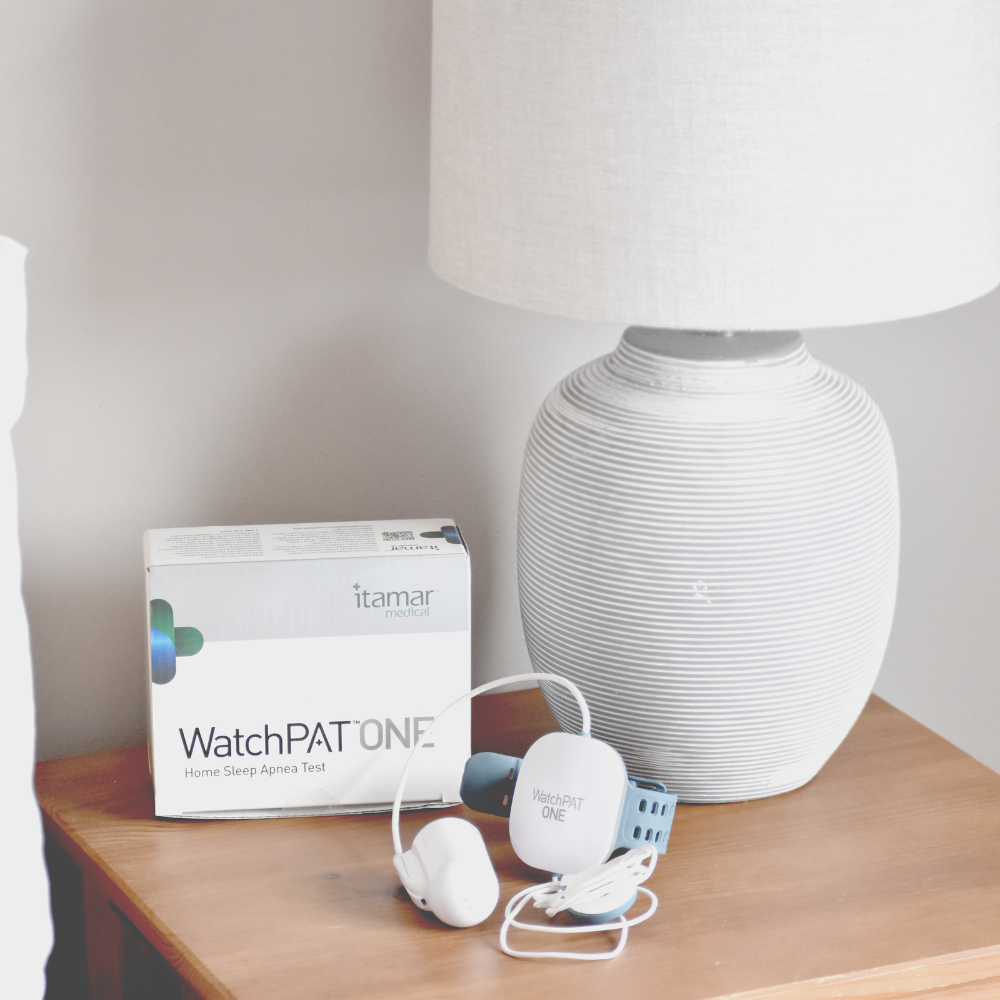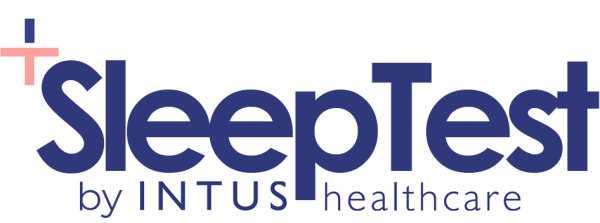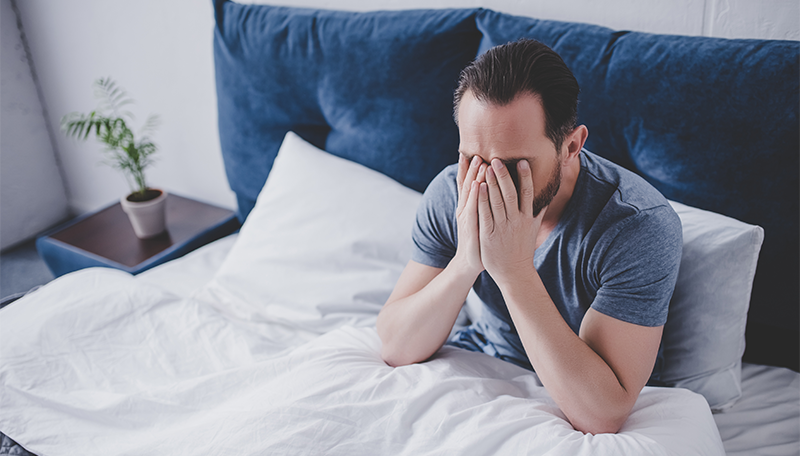Fact Checked
Intus Healthcare’s writers, customer service team, and sleep experts review and ensure this information is accurate.
Last updated on March 31st, 2025 at 11:16 am
There are few things worse than starting the day with a headache.
Believe it or not, it is estimated that as many as one in every 13 people suffer from morning headaches on a regular basis (1).
This article will explain the possible reason you are waking up with a headache and ways to solve it.
Table of Contents
Types of headaches that are more common in the morning
There are three types of headaches which typically occur in the morning.
- Tension Headaches: Tension headaches are the most common type of headache and can occur at any time, including in the morning. They often feel like a dull, constant pressure or tightness around the head, especially on both sides. Stress, poor posture, lack of sleep, and dehydration can contribute to tension headaches.
- Cluster Headaches: Cluster headaches are intense and excruciating headaches that tend to occur in clusters or cycles, typically at the same time each day, including the morning. They usually last for a short time, but the pain can be severe. Cluster headaches are more common in men and are often accompanied by other symptoms like a runny or stuffy nose, red or teary eyes, and facial sweating.
- Migraine Headaches: Migraine headaches can occur anytime, but some individuals may experience migraines more frequently in the morning or upon waking up. Migraines cause throbbing pains, usually on one side of the head, sensitivity to light and sound, and sometimes nausea or vomiting. Changes in your sleep patterns, such as oversleeping or irregular sleep, can trigger migraines.
Can sleep deprivation cause headaches?
Yes, scientists have found a connection between reduced sleep and headaches in the morning. This is because lack of sleep reduces the pain tolerance threshold, making headaches more likely (2).
Waking up tired with a headache: Possible causes
If you wake frequently with headaches in the morning and are looking for a remedy, here are some conditions that can cause morning headaches. If your headaches cannot be attributed to dehydration, medications or teeth grinding, then it could be a sign of a sleep disorder.
Migraines
Research indicates that migraines affect up to 14% of the global population (3). These headaches are known for severe pain, sensitivity to light, nausea, and (occasionally) vomiting. One of the reasons why migraines tend to be more prevalent in the morning hours is that any medication taken overnight will wear off by this time. Although women are more likely to suffer from migraines than men, the truth of the matter is that this condition can affect anyone.
The overuse of specific medications
Some medications might induce headaches in the morning, particularly if you are already taking prescriptions for painkillers. If caffeine happens to enter into the equation (such as a traditional cup of coffee), you could cause what is known as medication overuse headaches (MOH). Speak with your doctor to learn more about any possible alternative options which may be available.
Dehydration
Dehydration occurs when your body loses more fluids than it takes in, leading to an insufficient amount of water to carry out normal bodily functions. Several factors can contribute to dehydration, such as not drinking enough water, excessive sweating, vomiting, diarrhoea, and certain medical conditions.
During sleep, your body continues to lose water through respiration and sweat, even if you’re not active. If you go to bed even mildly dehydrated, this can worsen overnight and lead to a more significant state of dehydration by the time you wake up. As a result, you may experience waking up tired with a headache.
Hangovers
Anyone who has enjoyed a night out on the town is likely aware that a hangover can cause headaches. There are two reasons behind this situation. First, the body becomes dehydrated when an excessive amount of alcohol is consumed. As alcohol is also a vasodilator, the expansion of blood vessels can place pressure on the nerves within the skull. Other symptoms of a hangover include dizziness, difficulty concentrating, extreme thirst, and an overtired feeling.
Insomnia
Many individuals suffer from insomnia, and while this condition can drastically impact your daily life, it has also been known to cause headaches. There are many symptoms associated with insomnia, and the most prominent include:
- Feelings of tiredness during the daytime
- Anxiety or irritability
- Difficulty remaining focused
- Fatigue
Not only can insomnia disrupt normal sleep cycles known as circadian rhythms, but the added muscle tension due to a lack of sleep may contribute to headaches in the morning. As always, speak with a doctor or sleep specialist to learn about what treatment options may be available.
TMJ
TMJ is an acronym for a portion of your jaw known as the temporomandibular joint. Those with TMJ disorder tend to hold a great deal of muscular tension where the jaw connects to the base of the skull. As a result, this type of stress can easily cause headaches in the morning. Such a situation may be particularly problematic because many individuals are not aware that they may be suffering from this condition.
Some common symptoms include a clicking within the jaw, overall facial soreness and pain that radiates to other portions of the head or the neck. Still, doctors can prescribe a specific mouthpiece intended to prevent the unconscious clenching of the jaw while sleeping. As a result, the number of headaches is likely to reduce dramatically.
Stress and/or Anxiety
Stress-induced headaches do not only occur during the day. If you already have difficulty sleeping, you could unconsciously tense the muscles around your jaw, face and eyes. This leads to muscular fatigue and, in some cases, headaches.
Although such a situation has emotional roots, the fact of the matter is that the physical effects can be quite debilitating. This is why it is a good idea to practice relaxation techniques before sleeping; you will likely achieve a more satisfying rest.
The link between Obstructive Sleep Apnoea and morning headaches
Obstructive Sleep Apnoea (OSA) is when the airways either partially or completely close while sleeping. This can be caused when throat muscles relax. This happens while you’re sleeping, so you may not be aware of it happening.
Research has found that 18% of those with Obstructive Sleep Apnoea (OSA) suffer from waking up tired with a headache (4). Unlike usual headaches, these do not pulsate and are not accompanied by a sensitivity to light or sound.
The possible dangers are nonetheless very real. To obtain a correct diagnosis, it is first important to recognise some of the symptoms and long-term health effects. Some common symptoms of Obstructive Sleep Apnoea include:
- Feeling extremely tired during the day.
- Excessive and loud levels of snoring (often detected by a partner).
- Waking up short of breath or coughing.
- Choking during sleep
- Memory loss
Some possible health impacts of Sleep Apnoea are:
As you might have already imagined, morning headaches indicate that OSA might be present. The good news is that it is normally relatively easy to determine whether this condition is present. Let us look at why at-home sleep testing is an excellent option.
In-Home Sleep Testing
If you suspect that the morning headaches you are experiencing could be caused by Obstructive Sleep Apnoea, you are advised to perform a Sleep Test. This non-invasive test can be done quickly and accurately at home, or you can contact your GP or local sleep clinic.
A sleep test is intended to monitor your sleeping habits during overnight hours, determining whether or not you have Sleep Apnoea and the severity of its symptoms.

Home Sleep Apnoea Test
The test monitors your heart rate, snoring intensity, blood oxygen levels, body positioning, and more, providing accuracy comparable to testing used in sleep clinics for in-depth sleep analysis.
The simple-to-use test takes just one night to complete, and results are returned within two working days after completion.
Our experienced NHS-qualified sleep professionals independently analyse all studies, providing follow-up advice and support.
Stopping Morning Headaches in Their Tracks
There is no reason why anyone should consistently wake up with a headache. Unfortunately, many individuals believe that there are limited options at their disposal. Nothing could be further from the truth. However, it is first critical to diagnose the exact cause of these headaches so that the appropriate treatments can be made available.
If you suspect you may have OSA, do not hesitate to undertake an at-home sleep test. This quick examination could very well represent the first step down the road to a headache-free morning.
About Our Editorial Team
Danni is a degree-educated content writer passionate about helping those with Sleep Apnoea sleep better; she works closely with our clinical and customer care teams to ensure that each article is thoroughly researched and accurate.
Her writing aims to inform, support, and advise readers about Sleep Apnoea, helping to raise awareness and promote effective treatment options.
She has written many health-focused articles, reaching hundreds of readers annually, to help people sleep better and live healthier lives.
Lateisha King is an experienced Sleep Clinician with advanced training in polysomnography and respiratory health.
With over six years of experience, including at the prestigious Guy’s and St Thomas’ NHS Foundation Trust Hospital, she has conducted and reviewed more than 500 diagnostic sleep studies.
Her expertise in sleep science ensures that all articles align with the latest data and treatment protocols, providing readers with trustworthy and practical advice to improve their sleep health and overall well-being.
References:
- Healthline (2021). Early Morning Headaches. Available at: https://www.healthline.com/health/headache/early-morning-headaches. Accessed: 14.02.2023.
- Sivertsen B, Lallukka T, Petrie KJ, Steingrímsdóttir ÓA, Stubhaug A, Nielsen CS. Sleep and pain sensitivity in adults. Available at: https://pubmed.ncbi.nlm.nih.gov/25915149/. Accessed: 25.11.2024
- Stovner, L.J. et al. (2022) ‘The global prevalence of headache: An update, with analysis of the influences of methodological factors on prevalence estimates’, The Journal of Headache and Pain. Available at: https://thejournalofheadacheandpain.biomedcentral.com/articles/10.1186/s10194-022-01402-2. Accessed: 14.10.2024.
- Michael B Russell (2014), Headache in sleep apnea syndrome: epidemiology and pathophysiology. Available at: https://pubmed.ncbi.nlm.nih.gov/24928423/. Accessed: 19.08.2019.
Published: August 19, 2019





